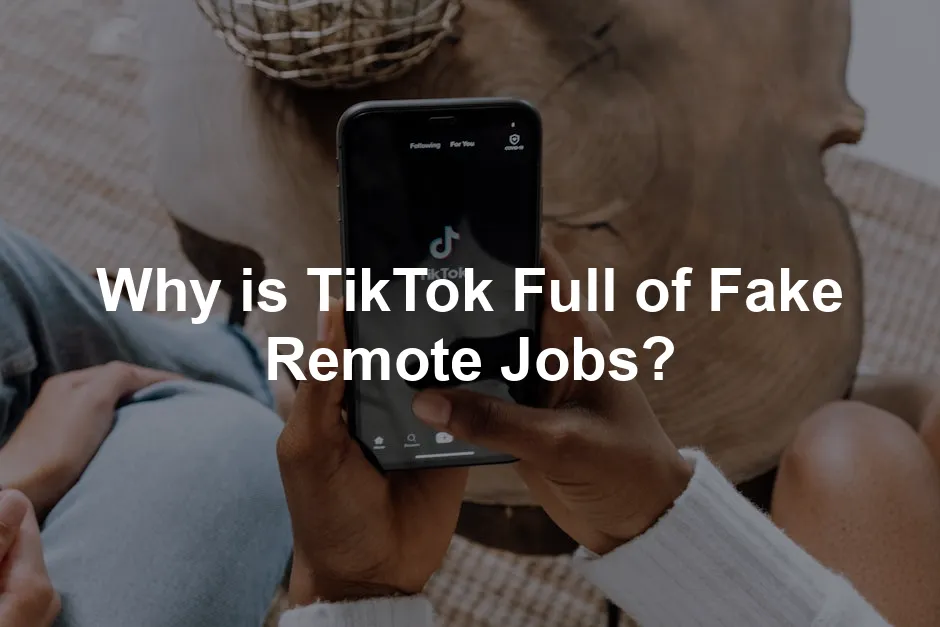
Why is TikTok Full of Fake Remote Jobs?
Introduction
Have you noticed the surge of fake remote jobs on TikTok? As the platform gains traction among job seekers, it attracts not only genuine opportunities but also misleading postings. This trend raises significant concerns, making it essential for users to stay informed and vigilant. Awareness is key to navigating this landscape safely.
For those navigating the job market, the Job Search Handbook for People with Disabilities can be a valuable resource, offering tailored strategies for overcoming unique challenges in the job search process.

Summary and Overview
The issue of fake remote jobs on TikTok has become increasingly prevalent. Scammers employ various tactics, often using flashy ads that promise high salaries for minimal work. These deceptive offers target vulnerable job seekers, leading many to unwittingly share personal information or, worse, pay fees for nonexistent opportunities.
It’s crucial to verify job offers before engaging further. This article will explore the appeal of TikTok for scammers, the nature of fake job postings, and practical tips for identifying and avoiding scams. By understanding these elements, you’ll be better equipped to protect yourself in the job market.
If you’re serious about improving your job search strategy, consider picking up The 4-Hour Workweek by Timothy Ferriss. This book encourages you to rethink your approach to work and life, enabling you to create a lifestyle that suits your needs.
Understanding the Appeal of TikTok for Job Scammers
The TikTok Platform
TikTok boasts a diverse user base, primarily made up of younger audiences eager for quick content. With millions of active users, the platform’s engaging nature makes it an attractive space for both job seekers and scammers. The viral format allows misleading job ads to spread rapidly, reaching countless potential victims in a short time.
Scammers capitalize on TikTok’s popularity by crafting enticing job offers. They often utilize catchy phrases and high pay rates to grab attention. The fast-paced environment encourages users to act quickly, making it easier for scammers to trap unsuspecting job seekers. As TikTok continues to grow, so does the risk of encountering these fraudulent job postings.

For a deeper understanding of how to navigate the challenges of remote work, check out Remote: Office Not Required by Jason Fried. This book provides insights into the benefits and challenges of working remotely, making it a must-read for today’s job seekers.
The Tactics Used in Fake Job Advertisements
Clickbait Strategies
Scammers know how to grab your attention. They often use eye-catching headlines that promise high pay for simple tasks. Phrases like “Make $100 an hour from home!” are common. These claims lure job seekers in, creating a false sense of hope.
Misleading job titles add to the confusion. You might see roles labeled as “remote” or “flexible,” but the descriptions often tell a different story. This bait-and-switch technique keeps job seekers clicking, leading them to dead ends.
It’s crucial to question these offers. Why would a company pay so much for minimal work? If it seems too good to be true, it probably is.

If you’re looking to enhance your job application skills, consider reading The Resume Book: How to Write a Resume That Gets You Hired. This guide can help you craft a standout resume that attracts employers.
Case Studies and Examples
Many TikTok users have shared their experiences with misleading job postings. One user, Jamie Jackson, highlighted a job advertised as “remote” but included a note saying, “Please do not apply if you’re looking for remote work.” This contradiction raised eyebrows and sparked discussions on TikTok.
Another user reported receiving calls for remote positions, only to find out they required in-person attendance. Misleading ads like these create frustration and distrust among job seekers.

Many have taken to social media, using hashtags like #jobscams and #fakejobs to share their experiences. The growing number of reports reflects a significant issue in the job market. Scammers exploit platforms like TikTok, targeting those eager for work with promises that rarely match reality.
By understanding these tactics, job seekers can better protect themselves. Always verify job offers before engaging further.
Impact on Job Seekers
Emotional and Financial Consequences
Job seekers often face intense frustration when encountering fake remote jobs. Imagine scrolling through TikTok, hopeful for a new opportunity, only to find misleading ads. This can lead to anxiety and disappointment, especially for those already stressed by unemployment. The emotional toll is real. The excitement of a new job can quickly turn to despair when faced with scams.
Financial repercussions can be significant as well. Scammers often ask for personal information, leading to identity theft. Some job seekers may even pay fees for applications or background checks that are never needed. This not only drains their finances but also places them at risk for further scams. The promise of easy money can blind job seekers to the dangers, causing them to act impulsively.

For those seeking to understand the financial aspects of their decisions, The Psychology of Money by Morgan Housel provides valuable insights into how our relationship with money impacts our decisions.
Job Market Trust Issues
The prevalence of fake job postings seriously erodes trust in remote work opportunities. Job seekers become skeptical, questioning the legitimacy of every posting they see. This creates a barrier for legitimate companies trying to attract talent. When a genuine opportunity arises, candidates may hesitate to apply, fearing another scam.
Moreover, these trust issues can impact the overall job market. Companies struggle to find qualified applicants as fear of scams looms large. Job seekers may avoid specific platforms, limiting their options and narrowing the talent pool. It’s a vicious cycle that can discourage both job seekers and employers.

In the end, this situation calls for heightened awareness. Job seekers need to be vigilant, while companies must work harder to establish their credibility. The job market suffers when trust breaks down, affecting everyone involved.
Identifying Fake Job Opportunities
Red Flags to Watch For
Spotting fake job postings can be easier with a keen eye. Look for signs like vague company details or generic email addresses. If a job ad lacks specifics, be cautious. Legitimate companies usually provide clear information about their roles and expectations.
Another red flag is overly enticing offers. If a job promises high pay for minimal work, it’s likely too good to be true. Scammers often use such tactics to lure in desperate job seekers. Always remember to research companies before applying. A quick online search can reveal a lot about a company’s reputation and legitimacy.

If you’re interested in optimizing your online presence, check out LinkedIn Profile Optimization for Dummies. This guide helps you create a standout profile that attracts potential employers.
How to Protect Yourself from Job Scams
Best Practices for Job Seekers
Finding a job online can feel overwhelming, especially with so many scams lurking around. Here are some practical tips to help you stay safe:
- Research the Company: Always investigate the company behind the job posting. Look for official websites and social media profiles. Genuine companies usually have a well-established online presence.
- Check Job Review Sites: Websites like Glassdoor and Indeed can provide insights into a company’s reputation. Read reviews from current and former employees to gauge legitimacy.
- Beware of Red Flags: Look out for vague job descriptions, high pay for minimal work, and poor grammar. If something seems off, trust your instincts.
- Never Pay for a Job: Legitimate employers will not ask for money upfront. If a job requires payment for training or materials, it’s likely a scam.
- Ask Detailed Questions: During interviews, inquire about job responsibilities and company culture. Scammers often avoid precise answers.

By carefully scrutinizing job postings, you can significantly reduce your risk of falling victim to scams.
To further enhance your job interview skills, consider reading The Ultimate Guide to Job Interviews Book. This resource can provide you with the tools needed to ace your interviews and land your dream job.
Reporting Scams
If you encounter fake job postings on TikTok, it’s crucial to report them. TikTok offers an in-app reporting feature for users to flag suspicious content. Here’s how to do it:
- Tap the Share Icon: On the video or post, click the share icon.
- Select Report: Choose the option to report the content.
- Follow the Prompts: Indicate that it’s a scam.

Community vigilance plays a vital role in combating scams. By reporting misleading posts, you help protect others and contribute to a safer environment on TikTok.
Together, we can create a more secure online job market. Stay informed and vigilant!
The Role of Social Media in Recruitment
Trends in Job Searching on Social Media
Social media has transformed the job search landscape. Platforms like LinkedIn have long been the go-to for professional networking and job listings. However, TikTok is emerging as a popular alternative. Its engaging format attracts younger users seeking quick job opportunities.
But while TikTok offers a unique way to connect, it poses significant risks. Users often encounter flashy job ads promising high pay for minimal effort. This trend can mislead job seekers, making it essential to exercise caution. Unlike LinkedIn, TikTok lacks stringent vetting processes for job postings. This gap allows scammers to thrive, capitalizing on the platform’s rapid content sharing.

If you’re interested in learning more about building a personal brand online, check out How to Build a Personal Brand Online. This book provides insights and strategies to help you stand out in a crowded job market.
Future Implications
As social media continues to evolve, so will recruitment strategies. TikTok may expand its job-related features, but this could also invite more scams. Job seekers must remain vigilant. Recruiters, too, should be aware of the challenges posed by these misleading ads. Building trust will be vital for the future of work.
Both job seekers and recruiters must adapt to this changing environment. Awareness and verification will be crucial in navigating this landscape. The future of job searching may depend on how well we manage these emerging trends.

Conclusion
When seeking remote jobs, especially on TikTok, it’s vital to remain cautious. The risk of encountering scams is high, and staying informed is key. Please share your experiences with job scams in the comments below. Together, we can raise awareness and protect others in the job market. Remember, both job seekers and platforms share the responsibility for maintaining a safe and trustworthy job environment.
It’s important to understand the risks involved in job searching on social media platforms like TikTok, especially when it comes to fake remote jobs.
For those looking to enhance their productivity while working from home, consider investing in an Ergonomic Chair for Home Office. Comfort is key when you’re putting in long hours!
Please let us know what you think about our content by leaving a comment down below!
Thank you for reading till here 🙂
All images from Pexels




